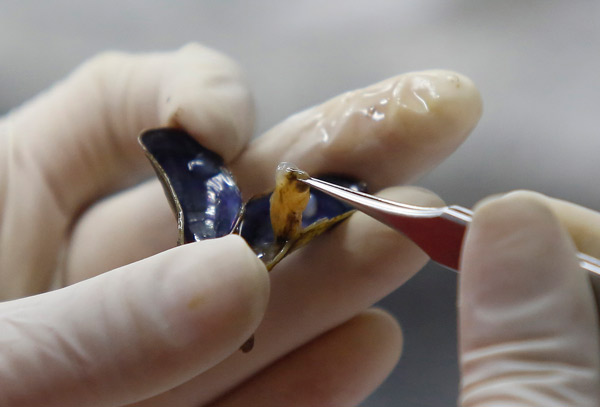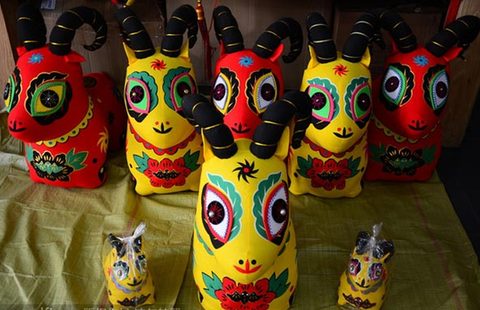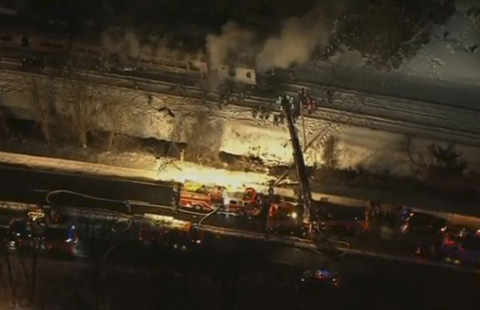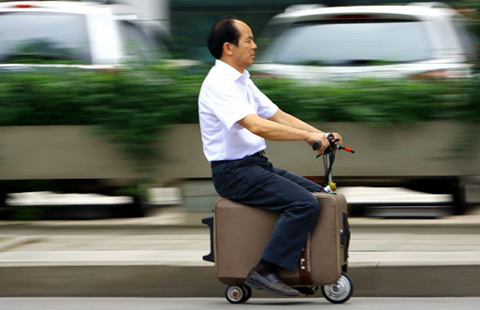Amazon threat posed by Chinese invader
Updated: 2015-02-06 03:13
(Agency)
|
||||||||
 |
|
A researcher tweezes a golden mussel out of its shell at the Carlos Chagas Filho Biophysics Institute in Rio de Janeiro, Brazil.[Photo/Agencies] |
The mighty Amazon is threatened by the most diminutive of foes — a tiny mussel invader from China.
Since hitching its way to South America in the early 1990s, the golden mussel has claimed new territory at alarming speeds, plowing through indigenous flora and fauna as it has spread to waters in five countries.
Scientists fear the invasive species could make a jump to the Amazon, threatening one of the world's unique ecological systems.
"There's no doubt the environmental effect would be dramatic," said Marcia Divina de Olivieira, a scientist at a Brazilian government research agency.
The golden mussel, which commonly grows to no more than 2.5 cm long, is a hardy breeder, reproducing nine months a year by releasing clouds of microscopic larvae that float with the current to new territories.
They attach themselves to hard surfaces like river bedrock, stones, man-made structures and even each other, forming large reef-like structures.
They have devastated native clam species by attaching themselves to the mollusks, sealing them shut.
Their ability to clog pipes has forced operators of hydroelectric and water treatment plants in Argentina to spend millions of dollars annually to clear them out or shut down turbines to scrape out giant mussel formations.
Golden mussels are filter-feeders, sucking in water and filtering out plankton and other microscopic bits of plant and animal life.
Their proliferation can alter phosphorous and nitrogen levels in the water, producing blooms of toxic algae that can be deadly to aquatic creatures and humans.
Hugh MacIsaac, a professor at the University of Windsor, in Ontario, Canada, who studies invasive aquatic species, said that while the thriving mussel colonies can mean more food for fish and ducks, the disruption of the food chain can upset local systems.
"You clearly want to keep these out of the Amazon because if they were to get in, the potential consequences are very significant," Mac-Isaac said.

 Australian journalist Peter Greste arrives home
Australian journalist Peter Greste arrives home
 Celebrating being mermaids at Merfest convention
Celebrating being mermaids at Merfest convention
 Snowboarder towed by a plane reaches speed of 78mph
Snowboarder towed by a plane reaches speed of 78mph
 Business opportunities of 'Year of the Sheep'
Business opportunities of 'Year of the Sheep'
 Italy's new president gets unanimous welcome
Italy's new president gets unanimous welcome
 At least 6 dead in Metro-North train crash
At least 6 dead in Metro-North train crash
 Torturous, beautiful and fun ways of commuting
Torturous, beautiful and fun ways of commuting
 NATO should not provide aid in Ukraine crisis
NATO should not provide aid in Ukraine crisis
Most Viewed
Editor's Picks

|

|

|

|

|

|
Today's Top News
'Rich agenda' for China, US cooperation: official
Chinese IPOs in US could cool
US deputy secretary of state to visit Asia
Lawyers: Evidence shows Saudi Arabia aided 9/11 hijackers
31 killed in TransAsia plane crash, 16 from Chinese mainland
Top Obama communications advisers to step down
Senior US official urges DPRK to act in 'good faith'
Plane with 53 passengers aboard crashes into river
US Weekly

|

|







